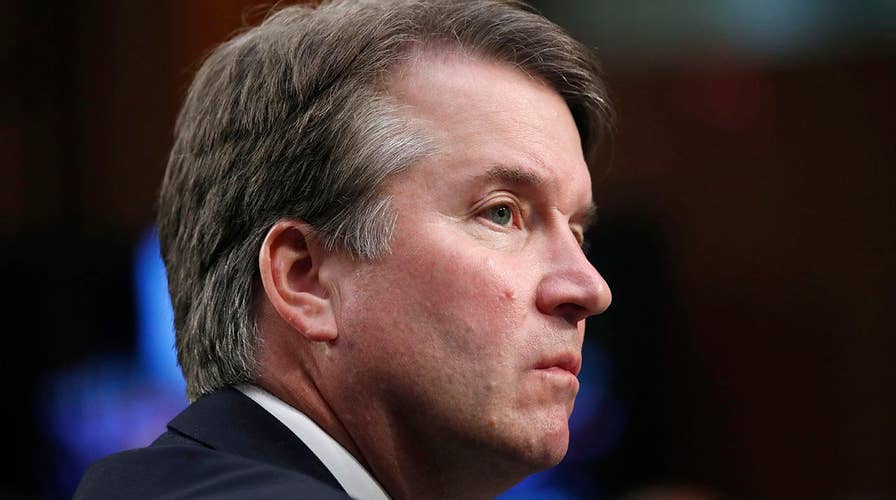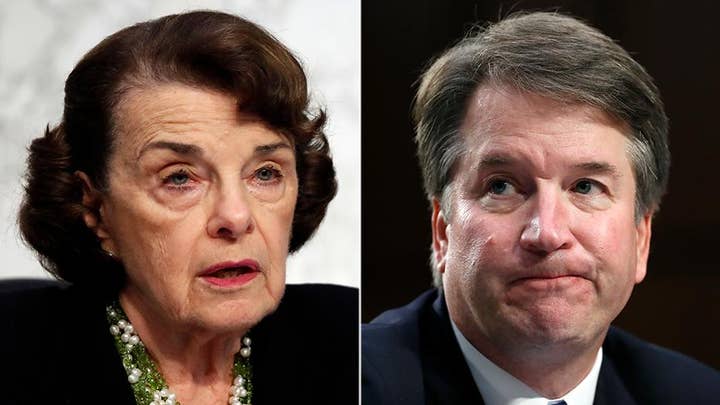Previewing the road ahead for Brett Kavanaugh
After a week of confirmation hearings, it's up to the Senate Judiciary Committee to vote on Supreme Court nominee Brett Kavanuagh and prospectively send his nomination to the floor so the full Senate can provide advice and consent.
The Senate Judiciary Committee is expected to vote Thursday in favor of the nomination of Judge Brett Kavanaugh to the Supreme Court, paving the way for a confirmation vote in the full Senate before the end of this month. Any fair reading of his record would lead senators of both parties to conclude he is extraordinarily qualified.
But most Democratic senators have made clear they have no intention of giving Kavanaugh fair consideration. Eager to show they are part of the anti-Trump “resistance,” Senate Democrats are resorting to absurd, outrageous and shameful behavior in a desperate attempt to keep President Trump’s nominee off the high court.
This has become a national embarrassment. No wonder so many Americans hold the Senate in such low regard.
The Supreme Court was created to be a nonpolitical branch of government that would judge cases impartially based on the evidence, arguments and the Constitution. As Kavanaugh said at his confirmation hearing before the Judiciary Committee earlier this month, Supreme Court justices are supposed act like baseball umpires – not like players on one partisan team or another.
Yet most Senate Democrats are treating the lifetime appointment of a Supreme Court justice like a patronage appointment of a political hack. Because Kavanaugh was nominated by a Republican president, the Democrats feel they must oppose him – or anyone else President Trump nominates to the high court.
Absurdly, Democrats are demanding to know in advance how Kavanaugh would rule on cases before they come to the Supreme Court. And even worse, they are engaging in character assassination of the judge, asking an unprecedented number of questions, and asking for documents going back decades – including many irrelevant to his qualifications for the high court.
Sen. Diane Feinstein, D-Calif., fired the latest political salvo at Kavanaugh on Thursday. The senator said a woman who does not want to be identified claimed that Kavanaugh, now 53, tried to force himself on her at a party when the two were in high school. Feinstein presented not one shred of evidence to back up her mudslinging.
Kavanaugh responded Friday. "I categorically and unequivocally deny this allegation," the judge said in a statement. “I did not do this back in high school or at any time."
It’s impossible for Kavanaugh – or any of us – to prove that a wild allegation about something we supposedly did decades ago is not true. That’s why our justice system puts the burden of proof on a person who makes an accusation, rather than on the accused. The concept of everyone being innocent until proven guilty of a charge is the foundation of fairness in our legal system.
Here’s what we know for sure about the claim of sexual misconduct by Kavanaugh in high school: no such claim ever surfaced in the six FBI full-field background investigations of Kavanaugh for federal employment from 1993 to 2018. No such claim was raised in the two hearings for his appointment to the U.S. Court of Appeals for the District of Columbia (where he has served for the past 12 years), or at his confirmation hearing for the Supreme Court.
And no such claim was raised in any meeting, conference call, or in any of the 1,278 written questions Kavanaugh received from senators on his Supreme Court nomination at the conclusion of his confirmation hearing.
Contrast this with the letter sent to the Judiciary Committee by 65 women who have known Kavanaugh since high school who say that he has always “behaved honorably and treated women with respect.”
Without evidence backing up the anonymous woman’s claim about Kavanaugh’s behavior in high school, senators shouldn’t give it any weight.
But the sexual misconduct charge is just the tip of the iceberg of the Democratic campaign to derail Kavanaugh’s nomination.
To cite another example: The number of written questions senators submitted to Kavanaugh after his confirmation hearing – the aforementioned 1,278 – is unprecedented.
The 1,278 questions are more than the total number of questions senators submitted to all 163 prior Supreme Court nominees in American history combined. Prior nominees altogether have gotten only 1,247 questions.
Feinstein alone sent Kavanaugh 241 questions – more than the 210 questions that Justice Elena Kagan received from all senators on the Judiciary Committee combined before she was confirmed, or the total of 214 questions that President Obama’s other nominee, Sonia Sotomayor, received from all senators.
Feinstein was not asking all those questions to decide whether to vote in favor of Kavanaugh’s confirmation. She declared in the summer that she would oppose his nomination – no matter how he answered questions or what anyone said about him during his September confirmation hearing. She said publicly in July that she was leading the “anti-Kavanaugh brigade” as the ranking minority member on the Judiciary Committee.
Democratic senators who questioned Kavanaugh repeatedly over a period of more than 32 hours during his confirmation hearing – often insulting and attacking him while doing so – have sent him a ridiculous number of additional written questions since the hearing ended.
In addition to the 241 questions from Feinstein, here are the number of questions from other Democratic senators on the committee: Sen. Chris Coons of Delaware – 192; Sen. Sheldon Whitehouse of Rhode Island – 161; Sen. Dick Durbin of Illinois – 128; Sen. Kamala Harris of California – 113; Sen. Mazie Hirono of Hawaii – 122; Sen. Patrick Leahy of Vermont – 117; Sen. Richard Blumenthal of Connecticut – 100; and Sen. Cory “Spartacus” Booker of New Jersey – 90.
Since Sens. Whitehouse, Blumenthal, Hirono, Booker and Harris have already said they are voting against Kavanaugh’s confirmation, what is the point of sending him hundreds of questions other than pure harassment? Keep in mind that in addition to four days of what seemed like an endless inquisition – including 28 witnesses after Kavanaugh left the hearing – the Judiciary Committee has received more than 500,000 pages of documents dealing with Kavanaugh’s career.
Documents received by the Judiciary Committee include 457,400 pages from Kavanaugh’s stint in the White House during the George W. Bush administration. This puts into proper perspective the constant complaint voiced by Democrats both during and after the hearing that they lack the information they need to review Kavanaugh’s record.
The committee also received more than 17,000 pages of material Kavanaugh submitted with his committee questionnaire from his speeches, articles, and teaching; and more than 10,000 pages of what is most relevant to his confirmation – all of the opinions he wrote or participated in during his 12 years as an appellate court judge.
Just as outrageous as the huge number of written questions submitted to Kavanaugh are the silliness of some of them. Whitehouse, for example, seems obsessed with baseball. He actually asked Kavanaugh: “For how many seasons have you purchased Washington Nationals season tickets? How many tickets did you purchase each year? What was the overall cost and cost per ticket? Please identify the individuals for whom you purchased baseball tickets.”
Kavanaugh actually answered this question by noting that “everyone in the group (of old friends) paid me for their tickets based on the cost of the tickets, to the dollar. No one overpaid or underpaid me for tickets. No loans were given in either direction.”
The last I heard, attending Washington Nationals baseball games is not a disqualification for being a justice on the S+upreme Court.
What a monumental waste of time. Somehow Democrats forgot to ask for Kavanaugh’s elementary school report cards and question babysitters who watched him as a young child.
The disgraceful conduct of Senate Democrats is just another sign of how broken and partisan the confirmation process for the Supreme Court has become.
At some point, the White House nominees must finally say “no” – they are not going to answer questions that have nothing to do with their qualifications and credentials. They must also realize that there is no point in cooperating with senators who have already said they are not voting for a nominee.
The behavior of Democratic senators throughout this confirmation process is no doubt intended to deter good conservatives who would make great public servants from ever agreeing to serve. These senators owe the American people a collective apology for their treatment of Kavanaugh – but don’t expect to get one.


